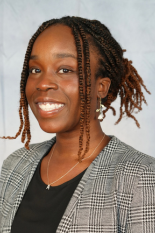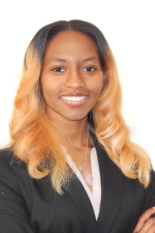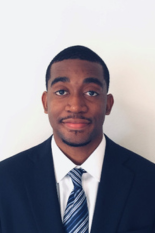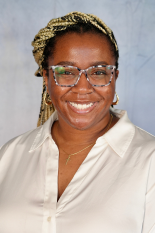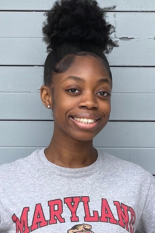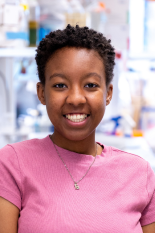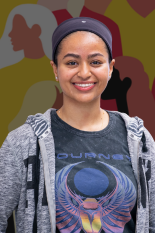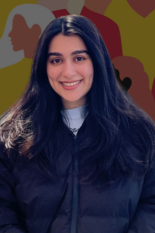News Story
Fischell Institute Black History Month Spotlight: Rebecca Louisthelmy
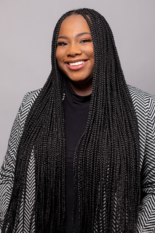
Rebecca Louisthelmy is a second-year bioengineering Ph.D. student in Fischell Institute Affiliate Fellow and BIOE Assistant Professor Katharina Maisel's Mucosal Associated Immune System Engineering and Lymphatics (MAISEL) lab. Louisthelmy graduated with her bachelor's degree in biomedical engineering from the University of Massachusetts Amherst in 2022.
Louisthelmy sought out the University of Maryland for her doctorate because of its proximity to her home state of New York, and her love for the DMV area. Upon visiting campus, she was impressed by the facilities and the strong sense of community within the bioengineering department.
“The intentional design of the building and laboratory spaces encourages graduate students to interact regularly, fostering a vibrant community atmosphere," she said. “Furthermore, the compelling research initiatives in the department caught my attention, and I feel fortunate to be part of a lab with an exceptional PI.”
Working with Masiel, Louisthelmy said, is truly incredible.
“Dr. Maisel is an outstanding PI—she is supportive, readily available, and offers valuable feedback,” Louisthelmy said. “She strikes the perfect balance of challenging and pushing me, while being understanding and approachable.”
Louisthelmy added that her lab mates have also contributed to her fantastic experience.
“We are a diverse group that gets along exceptionally well, even socializing outside of the lab,” she said. “I am confident that choosing UMD and joining Dr. Maisel's lab was the perfect decision for me.”
In her research, Louisthelmy is investigating how the shape of nanoparticles impacts their ability to be transported into lymphatic vessels. To accomplish this, she is actively engaged in three projects: first, formulating nanoparticles with diverse shapes and evaluating their transport abilities across lymphatic endothelial cells; second, examining the influence of nanoparticle material properties on the formation and composition of a protein corona, as well as the stability of nanoparticles; and third, elucidating the cellular mechanisms employed by lymphatics to transport nanoparticles of varying shapes.
“This is exciting because of the potential long-term impact on drug delivery and vaccine development,” Louisthelmy said. “By studying the effects of nanoparticle shape on transport into lymphatic vessels, we can contribute valuable insights that guide the design of therapeutics. This not only enhances immunotherapeutic efficacies, but also informs the development of biological probes to assess how disease and inflammation influence lymphatic transport functions, paving the way for more targeted and effective drug delivery strategies directly to lymph nodes.”
As a Black engineer, Louisthelmy's identity as a first-generation Haitian American undeniably influences her academic and career pursuits.
“Growing up in an environment with underrepresented communities and limited resources has instilled in me the resilience and resourcefulness needed for navigating the challenges of a Ph.D. program,” she said.
This background gives her a competitive edge and contributes to the diversity of thoughts in engineering. Louisthelmy's global perspective, rooted in her cultural background, prompts her to ensure that her research work is translatable and accessible in both low- and middle-income countries.
“This commitment aligns with my goal to address broader societal needs and make a meaningful impact on a global scale,” she said. “Moreover, being a representation for young minorities, particularly Black women aspiring to pursue engineering, is a responsibility I embrace wholeheartedly. I want to inspire and contribute to greater diversity and inclusion in the field.”
Louisthelmy also takes pride in mentoring and overseeing three undergraduate students in the MAISEL lab.
“It's personally gratifying to reach a point in my research career where I can actively contribute to the development of others,” she said. “This experience not only reinforces my confidence, but also acts as a remedy for imposter syndrome, as I am meticulous in ensuring my own understanding of the research before guiding and training others.”
In an effort to improve her skills as a mentor, Louisthelmy participated in the Fischell Institute and BIOE department's Center for the Improvement of Mentored Experiences in Research (CIMER) training sessions, which earned her a mentoring certificate.
Louisthelmy believes celebrating Black History Month is important because it provides a dedicated time to recognize and honor the invaluable contributions of Black individuals throughout history. In the context of STEM, this celebration is significant, as it highlights the often-overlooked achievements of Black pioneers in science, technology, engineering, and mathematics.
“By spotlighting these trailblazers, we not only acknowledge their groundbreaking work, but also inspire future generations of Black individuals to pursue and thrive in STEM fields,” she said.
“Additionally, Black History Month serves as a reminder of the importance of diversity and inclusion, fostering an environment where all voices and perspectives are valued, ultimately contributing to innovation and progress in STEM and beyond.”
In the future, Lousithelmy hopes to establish and lead her own research lab, with a focus on producing impactful research in the realms of drug delivery, vaccines, and medicine. She wants to address the needs of low- and middle-income communities and countries, particularly in her home country of Haiti.
Outside of the lab, Louisthelmy is passionate about music. She is a devoted singer with a background in professional backing vocals (BGV).
“Singing has been a part of my life for as long as I can remember, and I actively contribute to my church's worship team,” she said.
Beyond music, she indulges in hobbies such as cooking, exploring different cuisines, and traveling.
Published February 16, 2024
